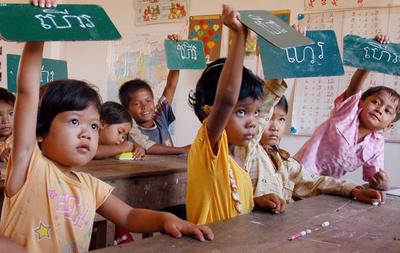which have supported the economic development trajectory of those countries, but now struggle to incorporate different forms of knowledge in policy-making.
There are a number of factors which may explain this. First, the way a policy decision impacts on major interest groups is a major factor determining the space available for evidence-based decision-making and broad-based input into policy-making. In Cambodia, for instance, the healthcare sector is relatively marginal to the ruling party’s interests, as it affords smaller opportunities for rent capture than other sectors. This means there is a relatively strong role for expertise and evidence in policy: donors often play the role of ‘agenda setters’ and healthcare professionals are able to hold powerful positions in the Ministry of Health. Conversely, in Vietnam, economic growth has been a key priority for the state since the 1980s. Vietnam has invested significantly in generating information and cultivating expertise (often with the help of donors), to help achieve this.
Second, prevailing power structures within the different societies have resulted in highly hierarchical decision-making processes. In Vietnam, rapid growth has seen the emergence of new business interests, some of which (particularly SMEs) are independent of the state; a more vocal National Assembly and an evolving ‘civil society’. This means there is a broader range of interests and perspectives ‘competing’ for policy attention. Although formal guidelines and processes have in recent years been strengthened allowing for more consultation of different actors, these tend to be poorly implemented. Similar dynamics are at play in the Philippines, where the country’s well-structured deliberative policy-making process, are hampered by the hierarchical nature of the public administration system between national and sub-national levels, and among sub-national levels. Studies and research are rarely used to make policy decisions on key issues, such as reducing the vulnerability of urban communities to natural disasters.
Third, the incentive structures for both knowledge producers and experts shape the link between knowledge and policy. In Cambodia, limited domestic capacity in the health sector means that the knowledge base is made up of a highly fragmented group of donor-funded consultancies, which is reflected in the overlapping and contradictory nature of many health policies. In Vietnam, the way civil servants (including researchers) are recruited, trained, promoted and remunerated promotes excessive levels of insularity as officials often find greater incentives in short-term consultancy work for government and donors than in ensuring high quality policymaking. Meanwhile, in the Philippines, academics and research institutions do not have the incentives in place to reward the generation of policy-relevant knowledge. Academic careers are still determined by the quality and number of academic publications, and the overall relevance of research to policy is low.
Still, the situation across all three countries is far from static. In Cambodia, there is a genuine commitment to decentralisation especially to the provincial level, where there is a growing recognition that when party leaders demonstrate that they can deliver goods and services locally they can win votes. This creates potential to leverage expertise at the subnational level, to help identify local needs, problems and potential solutions. In Vietnam, some of the more prosperous municipalities and provinces are drawing on research and experimenting with more locally relevant policies to meet the needs of the poorest and to encourage small business development. And, in the Philippines, the space for decision-making at the sub-national level is being transformed into one that allows for the use of deliberative and participatory knowledge, particularly when this contributes to strengthening the legitimacy of political leaders.
In the words of Jackie Ashley, ‘we know how good decision-making works. It should be fact-based, deliberative and tested by real arguments.’ It’s up to the new political voices, as well as the governments, of these Southeast Asian economies to create and share knowledge and, at the same time, create the spaces to ensure that their policies are informed by strong evidence.
Arnaldo Pellini, Harry Jones and Ajoy Datta are Research Fellows at the Research and Policy in Development programme, Overseas Development Institute.


Thanks for this very interesting post. I’m particularly keen to know more about the approach taken in the Philippines to knowledge brokering and a localised approach to policy, if anyone can point me in the right direction.
Hi Nick, thanks for the comment. Pls find the full study report about the Philippines following this link (http://www.odi.org.uk/publications/7412-towards-policy-relevant-science-scientifically-informed-policy-political-economy-use-knowledge-research-evidence-urban-resilience-interventions-philippines).
You can also contact me directly at [email protected]
Thanks
Arnaldo